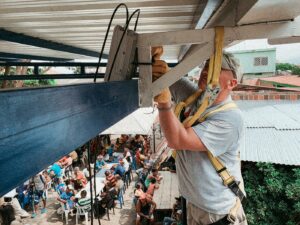In March 2019, Team Rubicon partnered with NetHope in Cucuta, Colombia to provide internet connectivity for NGOs that are serving Venezuelan refugees.
Over the past several years, the socioeconomic situation in Venezuela has been consistently deteriorating as a shrinking GDP and hyperinflation have strongly taken hold of the country. This has led to widespread shortages in food, medicines, health care, basic human necessities, and one of the worst humanitarian crises in the Western Hemisphere. This humanitarian crisis has led to a mass exodus of Venezuelans – more than three million – into Colombia and other neighboring countries.
When looking at this mass exodus of Venezuelan refugees, Eduardo Stein, the Joint Special Representative of the UN refugee and migration agencies, described the current population outflow as “unparalleled in the modern history of the region”. In a recent UN News story, Stein said:
“Last year Venezuelans left the country at a net rate of 5,000 per day and they continue to leave the country despite recent border closures on the Venezuelan side. If the trends in 2019 continue, we estimate that the total number of Venezuelans outside the country will exceed 5 million by the end of the year.”
Given its long, porous border that neighbors Venezuela, Colombia has taken in a majority of the Venezuelan refugees. In fact, the Colombian government estimates that over one million Venezuelans have fled to Colombia. Non-Governmental Organizations (NGOs) are stretching to deliver protection, aid, and relief-related services to highly vulnerable Venezuelans escaping into Colombia.
Displaced Venezuelans residing in border areas need access to reliable internet connectivity so they can get access to critical information on humanitarian and relief services available to them as they transition into a new life. According to surveys from Mercy Corps and IRC, access to information about their rights, ability to formally register their presence in country, employment opportunities, health services, and basic necessities assistance is an expressed need of Venezuelan refugees.
Additionally, protection issues of the refugee population are one of the key needs identified by the international humanitarian community. Implementation of prevention and protection mechanisms is crucial to reduce occurrences of gender-based violence and trafficking. Furthermore, access to relevant information and guidance on where refugees can receive assistance also helps reduce potential recruitment and forced labor use of refugees by armed actors in the border areas.
Unfortunately, gaining access to this information has been tough in some areas due to a lack of reliable internet connectivity. During an assessment trip conducted in May 2018 NetHope found that reception centers, schools, and buildings near the Colombian border – tabbed with assisting refugees – had little or no internet connectivity in place. This lack of connectivity hampers NGOs working in these areas ability to provide critical services and timely, accurate information for Venezuelan refugees.
To help address this unmet need Team Rubicon, in partnership with NetHope, deployed a task force of nine volunteers – well versed in technology – to Cucuta, Colombia in March. The Team Rubicon tech specialists worked alongside NetHope to install open internet access points at towers, buildings, schools, and reception centers that have been identified as locations for Venezuelan refugees to visit to get support and humanitarian assistance.

Team Rubicon’s Steve Scammacca installing an open internet access point at a center that serves Venezuelan refugees in Cucuta, Colombia.
Based on findings from their assessments, NetHope pre-identified and assigned Team Rubicon’s task force 21 locations to complete installs at. During their two-week deployment, Team Rubicon’s task force successfully completed all 21 installations – including a site install at the immigration center located at the Simon Bolivar International Bridge that connects Colombia to Venezuela.
“It was an honor and a privilege to serve with this tech-focused task force in Cucuta, Colombia,” said Steve Scammacca, Associate of Field Technology at Team Rubicon and a tech specialist on the Colombia task force. “Working with our partners NetHope, Cisco Tactical Operations, and Ericsson Response allowed Team Rubicon’s technology capabilities to directly impact and positively contribute to the quality of life of those affected by this humanitarian crisis.”
By enhancing access to internet connectivity in these locations, NetHope, their member organizations, and other local NGOs can more effectively serve Venezuelan refugees. And, they can move forward with plans to establish information portals for Venezuelan refugees to provide them with the highly relevant and accurate information they need on where and how they can get support and assistance as they transition into a new life.



